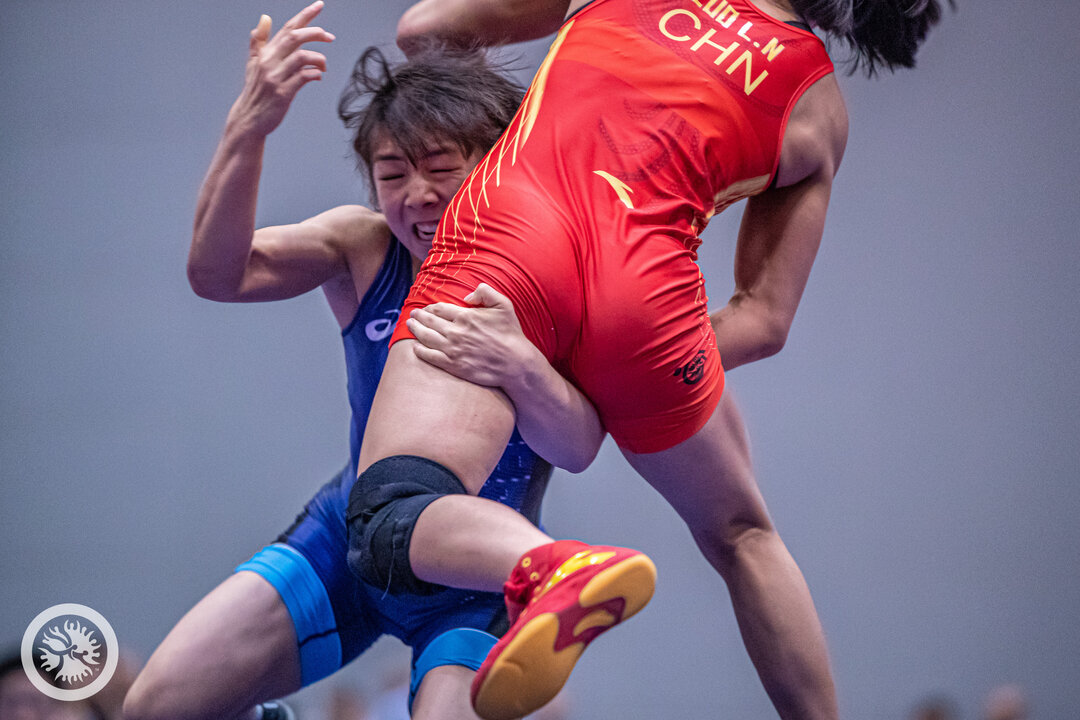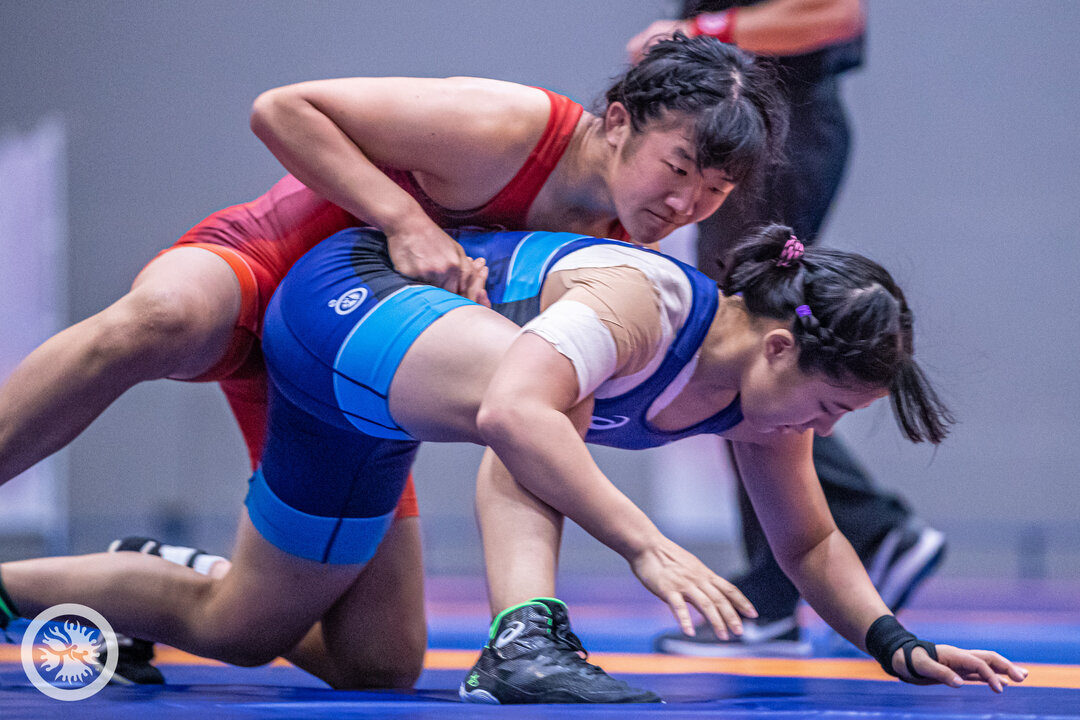#WrestleTokyo Olympic Games Preview: 53kg
Wednesday, July 21, 2021 - 18:05 By Ken Marantz

TOKYO, Japan (July 23) – Vinesh PHOGAT (IND) got over the physical pain she suffered at the Rio 2016 Olympics long before the emotional scars healed. Five years later, that bitter memory is fueling her quest to become India's first-ever Olympic wrestling gold medalist.
Phogat is the top seed in the women's 53kg division at the Tokyo Olympics, but that hardly lessens the difficulty of the task that lies ahead of her in a field that might be missing the reigning world champion, but little else in terms of quality.
"The journey to Tokyo has been long, bittersweet and difficult at times,” Phogat wrote on social media last week while training in Hungary, as reported in north India's Tribune. "The injury in Rio was easily one of the lowest moments in my career, and even had me questioning whether I would ever be able to wrestle again."
Arguably Phogat's biggest barrier to Olympic glory will be 2019 world silver medalist Mayu MUKAIDA (JPN), the No. 2 seed and two-time former world champion who has some issues of her own to work out.
An array of past and present world champions and medalists will also be looking to make their mark on the mat at Makuhari Messe, including fourth-seeded Qianyu PANG (CHN), veteran Sofia MATTSON (SWE), Vanesa KALADZINSKAYA (BLR) and Jacarra WINCHESTER (USA), the reigning world 55kg champion who moved down to the Olympic weight.
Phogat is already making Indian history as the first woman from her country to be appearing in a second Olympics. The Asian nation was a bit late to the women's game, and did not qualify a woman for the Olympics until 2012 and has had just four in total. That number has been doubled in Tokyo.
At the Rio Olympics, Phogat advanced to the quarterfinals at 48kg, only to suffer a severe knee injury against Yanan SUN (CHN) that required her to be taken off the mat on a stretcher. She returned to competition the following May at the Asian Championships, where she won a silver medal at 55kg.
The 26-year-old Phogat has accumulated quite a haul of medals on the senior level at the Asian Championships, eight in total, although her gold medal in April in Almaty was the first of that color and came in the absence of the Japanese and Chinese. She also won a gold from the 2018 Asian Games, where she defeated Yuki IRIE (JPN).
But Mukaida has been a particular thorn in her side in recent years. The two met in the quarterfinals at the 2019 Asian Championships, the first round at the 2019 World Championships and the quarterfinals of the 2020 Asian Championships, with Mukaida winning all three encounters.
Phogat arrives in Tokyo coming off a confidence-boosting two years of success. She won the 2020 Matteo Pellicone Tournament, which included victories over Pang and Tokyo No. 3 seed Luisa VALVERDE (ECU), and repeated her Rome triumph this year. She also won the Poland Open in June, making her 3-for-3 for 2021.
Whether she can keep the momentum going in Tokyo against the world's elite remains to be seen, but in a message to her Indian fans, she is aiming to "put a smile on all your faces with my performance on the mat."
The 24-year-old Mukaida has been thrilling Japanese fans since her younger days, when she was being compared to another native of Mie Prefecture in central Japan, the legendary Saori YOSHIDA (JPN). In fact, as she began piling up the titles, including world cadet and Youth Olympic championships, she was dubbed the "second generation Yoshida."
It was a tough reputation to live up to, but the product of the JOC Elite Academy did it with world titles at 55kg in 2016 and 2018. But on several occasions, Mukaida was her own worst enemy, looking like Yoshida until the final five seconds of matches.
That is the biggest knock against Mukaida--her inability at times to finish off what should be easy victories. It happened in three major finals, all at 53kg, over the past four years.
At the 2017 World Championships, Mukaida gave up a 4-point move at the buzzer to Kaladzinskaya and lost 8-6. At the 2019 Asian Championships, she gave up takedown in the final seconds to Yongmi PAK (PRK) in a 4-3 loss. And at the 2020 Asian Championships, she was leading 8-0 and trying to score a gut wrench that would end the match when Tatyana AKHMETOVA AMANZHOL (KAZ) stepped over and caught her for a victory by fall.
"I do alright in the first half of the match, but I often get attacked by the opponent in the second half and start watching the opponent's movement," Mukaida recently told the Japanese press. "When I lose, my movement stops completely. That's the thing I need to fix the most."
One thing going for Mukaida is that she does not have to contend with Pak, as DPR Korea will not be sending a contingent to the Tokyo Games. Mukaida had a chance to avenge her loss in Xi'an to Pak when the two met in the final of the 2019 World Championships, but instead Pak handed her one of the worse defeats of her career with a 12-1 technical fall.
Mukaida will be on guard not to make similar mistakes at the Tokyo Games.
China's Pang was a 2019 world bronze medalist along with Phogat, the second straight year that she finished third. She and Phogat have split four matches between them from 2016 to 2020, while Pang is 0-4 in career clashes with Mukaida.
The 31-year-old Mattson she was dealt a one-sided loss by Phogat early at the 2019 World Championships, and earned her fourth trip to the Olympics by winning the European Olympic qualifying tournament. She will be aiming to add to the bronze medal she won at Rio 2016.
Mattson won world titles in 2006 and 2009, and is a four-time silver medalist, including losing to Yoshida in three straight finals from 2013 to 2015. In January this year, she took the gold at the Grand Prix de France, beating Winchester in the final 7-4.
Winchester's move down to 53kg coincided with a drop to 50kg by Sarah HILDEBRANDT (USA), who had failed to earn an Olympic place at 53kg at the 2019 worlds. Like Hildebrandt, Winchester secured her ticket to Tokyo for the USA at the Pan American Olympic qualifying tournament, then won the U.S. Olympic trials. Prior to 2020, she had competed anywhere from 55kg to 59kg during her career.
Wrestling at the Tokyo Olympic Games kicks off August 1-7 at the Makuhari Messe with 65kg action beginning on August 5.
53kg
No. 1 Vinesh VINESH (IND)
No. 2 Mayu MUKAIDA (JPN)
No. 3 Luisa Elizabeth VALVERDE MELENDRES (ECU)
No. 4 Qianyu PANG (CHN)
Maria PREVOLARAKI (GRE)
Joseph Emilienne ESSOMBE TIAKO (CMR)
Rckaela Maree Ramos AQUINO (GUM)
Roksana Marta ZASINA (POL)
Laura HERIN AVILA (CUB)
Jacarra Gwenisha WINCHESTER (USA)
Sofia Magdalena MATTSSON (SWE)
Vanesa KALADZINSKAYA (BLR)
Bolortuya BAT OCHIR (MGL)
Tatyana AKHMETOVA AMANZHOL (KAZ)
Olga KHOROSHAVTSEVA (RUS)
Andreea Beatrice ANA (ROU)




Share your thoughts.
Comments